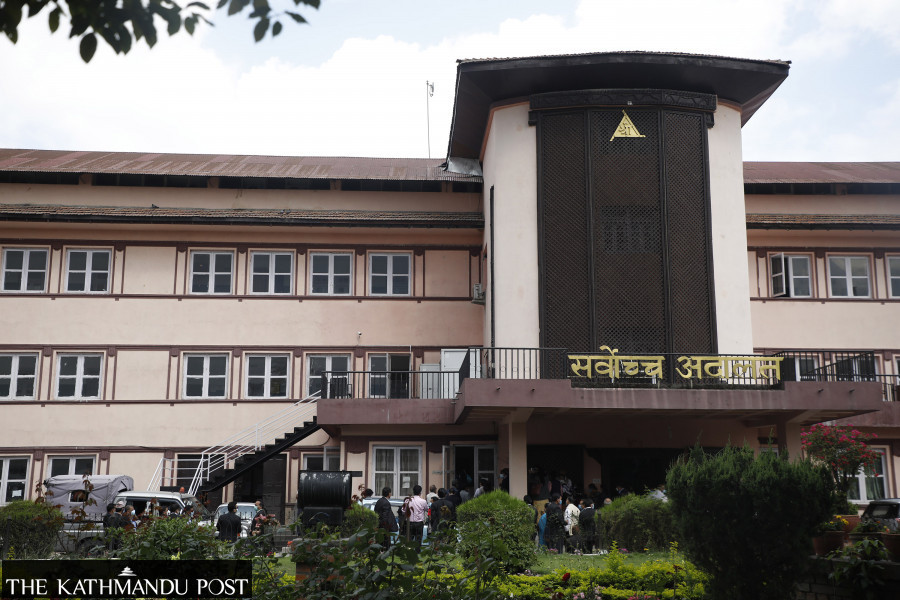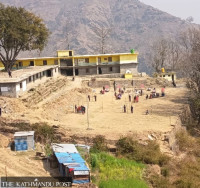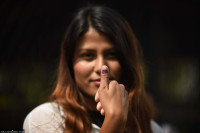National
Court observation on public debate on sub judice cases raises questions
Restricting public discourse could be tantamount to gag order, which is a detriment to democracy, analysts say.
Binod Ghimire
While issuing an interim order on Thursday with regards to the hearing by the Constitutional Bench on appointments to various constitutional bodies, Justice Hari Phuyal made an observation on public discourse on sub judice cases.
“There is a need to decide whether people from various walks of life and institutions should be allowed to make public their opinions and even official decisions regarding the cases that are being heard by the Supreme Court,” the bench observed.
The bench said the court should look into remarks by former chief justices and justices, formal decisions by Nepal Bar Association and the public debates by lawyers on sub judice cases and decide whether they are within the parameters of freedom of expression and judicial culture.
The observation was with regards to growing debate on whether Chief Justice Cholendra Shumsher Rana should lead the Constitutional Bench as it hears the petitions against the appointments to various constitutional bodies.
After questions were raised that Rana’s presence on the bench would constitute a conflict of interest, Rana had decided to allow the senior-most Justice Deepak Kumar Karki to lead the bench. The hearing was scheduled for Friday. But Justice Phuyal’s bench issued an interim order on Thursday, throwing the hearing into limbo.
As per the constitution, Rana, as the chief justice, should lead the Constitutional Bench. But since Rana, as the chief justice, is also a member of the Constitutional Council that recommends appointments to various constitutional bodies, lawyers say there was a clear conflict of interest.
As many as 52 appointments were made by the Constitutional Council after the erstwhile KP Sharma Oli government introduced an ordinance to amend the Constitutional Council Act.
Now with Justice Phuyal’s observation on public debate on sub judice cases, questions are being raised if the judiciary is attempting to gag the freedom of expression.
Senior advocate Dinesh Tripathi has already moved the court with a petition demanding vacating of the ruling by Phuyal’s bench. The petition is in the process of registration.
“Controlling public opinion is against the freedom of expression guaranteed by the constitution as a fundamental right,” said Tripathi.
Article 17 (2) (a) of the constitution ensures the freedom of opinion and expression.
“Barring opinion is not just an attack on freedom of expression but also against international norms and practices,” Tripathi told the Post.
In his petition, Tripathi has cited the “Report of the Special Rapporteur on Independence of Judges and Lawyers” which says judges and prosecutors, just like all citizens, can exercise their right to freedom of expression, belief, association, and assembly which has to be done in a way that doesn’t violate the dignity of their office.
When the erstwhile prime minister Oli first dissolved the House of Representatives on December 20, four former chief justices on January 8 had issued a joint statement, calling the move unconstitutional.
The House dissolution case was already at the Supreme Court, and the Constitutional Bench was hearing the case. The former chief justices had stated that Oli had no authority to dissolve the House.
Nepal Bar Association too had said the dissolution contradicted constitutional provisions.
Political parties like Nepali Congress and Janata Samajbadi Party, as well as some sections of the then ruling Nepal Communist Party (NCP), had taken to the streets calling the House dissolution unconstitutional.
After Oli’s December 20 move, public opinion too was divided. There were some with the view that public debate on the House dissolution was a wrong idea, as the case was sub judice.
Lawyers defending Oli’s House dissolution move too had raised the issue of public debate on a matter that was being heard by the Constitutional Bench.
Chief Justice Rana, who was presiding over the bench, however, had said that justices aren’t influenced by debates that take place out of the court.
Democracy defenders and proponents of freedom of speech say the judiciary should refrain from putting restrictions on public opinion under the pretext of sub judice cases as that could be a regressive move.
“Barring public debate would be against the norms of freedom of expression and democratic principles the country has embraced,” Daman Nath Dhungana, a former Speaker and civil society member, told the Post. “The Supreme Court should refrain itself from making any decision that stifles freedom of opinion and expression.”
According to Dhungana, since the court is yet to make a final decision, it should be cautioned.
A ruling to stop public debate on cases, especially those related to government decisions that can have a lasting impact, could be detrimental to democracy, observers say.
Freedom of political expression, freedom of speech and freedom of the press are basic tenets of Nepal’s democracy, and all the constitutions since 1990 have made them fundamental rights that make citizens adequately informed. Nepal’s constitution also explicitly envisions separation of powers between the executive, the judiciary and the legislature.
Oli met with criticism from various walks of life because he intended to destabilise the principles of checks and balances.
Observers say if Nepal’s judiciary, which in recent times has faced charges of failing to discharge its duties in a fair manner, indeed wants to improve its image, it should work to clean the house, rather than pointing fingers at others, observers say. According to them, the judiciary’s job is to focus on the evidence and arguments presented by the petitioners and defendants, rather than snooping about to find out if there is any public debate or discourse happening on sub judice matters.
Some say drawing a fine line would be in the larger interest of everyone, as judicial independence is as important as freedom of speech and expression.
Bipin Adhikari, a former dean at Kathmandu University School of Law, says unprincipled comments and opinions against sub judice cases must be avoided and need to be restricted.
“However, restrictions on debates on sub judice cases shouldn’t stretch to the extent where it breaches the freedom of expression,” said Adhikari.




 27.41°C Kathmandu
27.41°C Kathmandu














